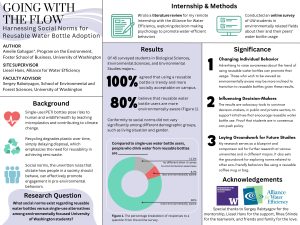GOING WITH THE FLOW: HARNESSING SOCIAL NORMS FOR REUSABLE WATER BOTTLE ADOPTION
The production and consumption of single-use water bottles harm human and wildlife health by leaching microplastics, depleting groundwater reserves, and contributing to climate change. By leveraging social influences and appealing to individuals’ desire for social assimilation, organizations and individuals can foster greater participation in collective efforts to address these issues. This study aimed to explore social norms among students in Biological Sciences, Environmental Sciences, and Environmental Studies majors at the University of Washington to assist in influencing decision- makers and creating marketing strategies that can encourage individuals to utilize reusable water bottles over single-use alternatives. My internship with the Alliance for Water Efficiency centered around conducting a literature review on behavioral economics principles within the water sector and recommending ways to apply the findings. This literature review served as the foundation for my research, which involved designing and administering a survey to gauge trends and perceptions regarding water bottle use among students in environmentally related majors. The results show that all 45 respondents believed there was a culture or trend surrounding reusable water bottles. Additionally, most students who agreed that using a reusable water bottle was more socially acceptable than using a single-use one on their campus and within their social circle were likely to have their actions follow suit. These findings highlight that strong social norms exist and individual actions may be influenced by a perception of what is socially desirable. By examining how groups perceive sustainable behaviors, we can harness the power of social norms to encourage collective action.
